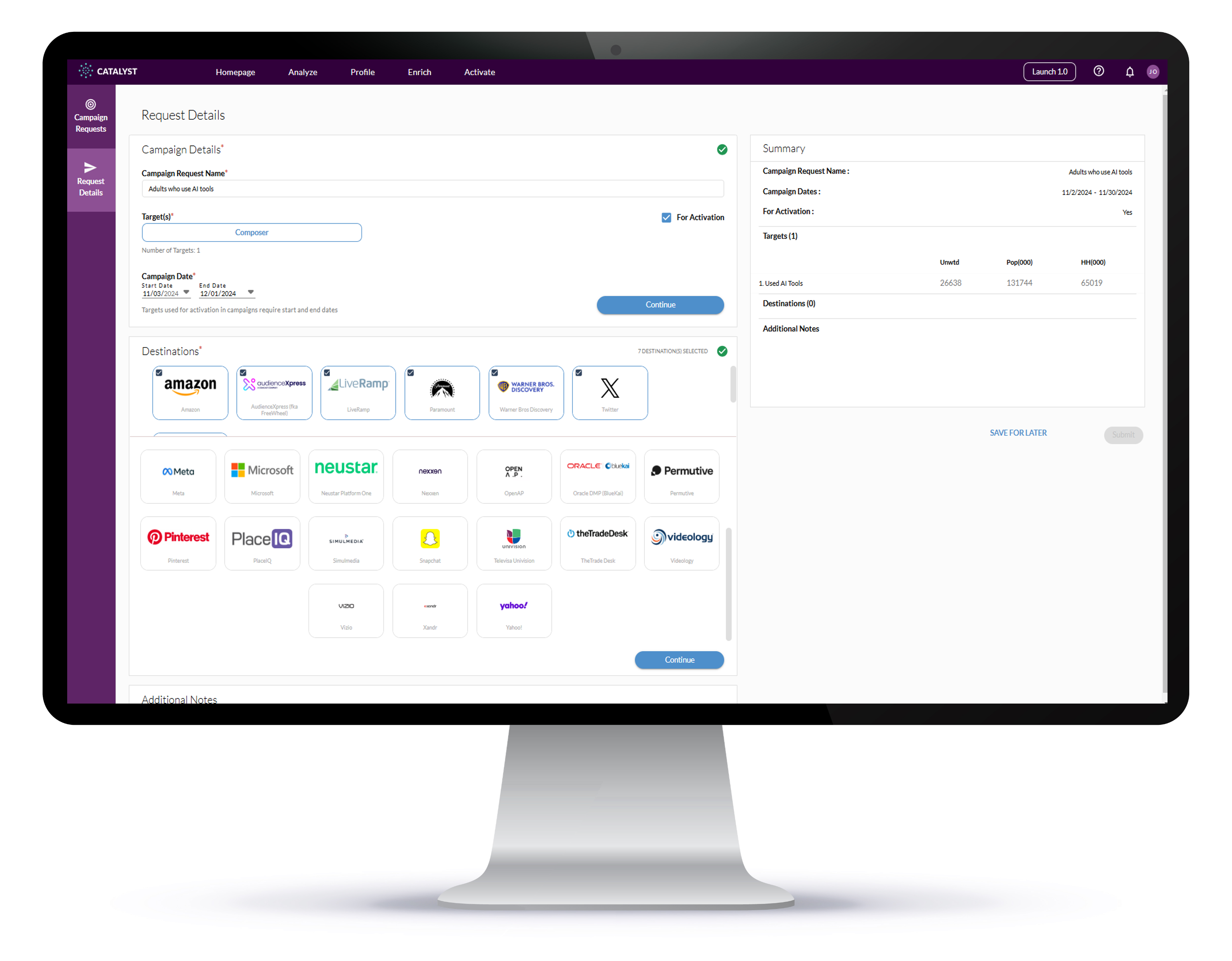The Human-AI Connection: What Advertisers Need to Know About Americans’ Views on AI
Artificial Intelligence (AI) is no longer just a buzzword or a futuristic concept; it’s a present reality with 53% of American adults – over 137 million – now using AI tools. For some, it’s a part of their daily lives. The allure of AI is evident, with the top reason for its use being the sheer curiosity to explore its capabilities. This growing trend signifies a shift in the way we interact with technology, making AI a topic of interest for media planners, brand marketers, and media companies.
Why AI Users Are Prime Targets for Marketers
Americans who incorporate AI into their routines represent a valuable demographic for marketers. These users are not just tech-savvy; they are pioneers at the forefront of adopting new technologies. In fact, AI users are 35% more likely than the average American to be the first among their friends and colleagues to try new technologies and 17% more likely to enjoy learning about new technology from others. As early adopters, these consumers help set trends. By understanding their preferences and behaviors, marketers can anticipate and capitalize on emerging trends, staying ahead of the competition.
With 32% of AI users utilizing AI for work-related tasks, these individuals are efficiency-driven and open to innovative solutions that streamline their professional and personal lives. This makes them ideal candidates for targeted marketing campaigns that introduce new products and services designed to enhance productivity and leisure.
The Conscious AI Consumer
Despite their enthusiasm, AI users are cautious, with 87% believing that AI requires careful management. This statistic highlights a user base that is both engaged and thoughtful about the implications of AI. Furthermore, 83% demand transparency regarding the storage and use of their personal data; however, one-third are OK with their personal information being used to better understand their preferences. AI users are 36% more likely to fall into MRI-Simmons’ “Data Burned & Returned” segment of Americans who feel some level of control over their data, find value in targeted advertising for products and services, and trust the federal government to make the best decisions about data privacy. This is beneficial to marketers because when consumers feel they have control over their data, they are more likely to engage with brands and share their information. Consumers who find value in targeted advertising are more receptive to personalized marketing efforts. This trust can lead to more personalized campaigns and higher conversion rates for marketers.
AI consumers aren’t only concerned about their personal data. They are also conscious about how AI tools can strengthen racial, gender, and economic divides, and 79% advocate for diversity in AI development teams to ensure equitable data representation. These insights suggest that marketing messages should emphasize ethical AI use, data protection, and equity to resonate with this audience.
AI’s Societal Impact and Job Security Concerns
Despite 73% of AI users being open to using AI at work and 69% believing it’s safe, concerns about how AI will impact the workforce are significant. 76% of AI users are apprehensive about AI’s societal impact, and 60% fear the potential of AI to replace human jobs - a sentiment shared by 50% of the general adult population. This fear is even more pronounced among Gen Z users, with 70% expressing anxiety over AI’s potential to displace human workers.
These concerns underscore the imperative for brands and marketers to shift the narrative around AI. It’s crucial to emphasize AI’s role as a supportive tool that enhances human capabilities. Marketers should highlight how AI can take over mundane, repetitive tasks, freeing up human workers to focus on more creative, strategic, and fulfilling aspects of their jobs. This not only alleviates fears but also showcases AI as a catalyst for innovation and productivity, which is supported by the 69% of AI users who think AI increases productivity in the workplace. By fostering an environment where AI and human intelligence coexist harmoniously, brands can position themselves as forward-thinking and socially responsible.
Recognition and Daily Use of AI Tools
While AI tools are becoming more prevalent, recognition varies. 75% of Americans are familiar with ChatGPT, making it one of the most recognized AI tools. However, there’s a gender gap, with women 24% more likely to be unaware of ChatGPT. Additionally, daily usage patterns reveal that Black Americans are 38% more likely to use Microsoft Copilot than the average American. Asian Americans are 66% more likely to opt for ChatGPT daily, while Hispanic Americans are more likely to go to Gemini (Index: 133). These statistics offer marketers nuanced insights into the demographics of AI tool users, allowing for more tailored and inclusive marketing strategies.
Activating AI Users
Through MRI-Simmons' activation solution, ACT, marketers can leverage trusted and nationally representative data to target and reach users of Artificial Intelligence (AI) tools. Curate your audience with over 60,000 consumer elements: 1000+ attitudes and opinions, 6500+ brands in 1000+ product categories; and 90+ proprietary segments. Then, activate your audiences via the DMP, DSP, SSP, MVPD, or programmer of your choice.

In conclusion, the integration of AI into everyday life presents a unique opportunity for marketers to connect with an audience that is not only tech-forward but also conscious of the ethical dimensions of AI. By understanding the diverse landscape of AI users and addressing their concerns, marketers can craft campaigns that are not only effective but also responsible.
Want to learn more about Americans’ usage of and attitudes on AI? MRI-Simmons’ Digital Life Study offers insights on how and why consumers access modern media and technology. Deeper analysis of simultaneous engagement and behaviors, as well as motivational drivers, are compiled alongside the extensive set of MRI-Simmons data.
Contact us today to learn more.
Source: 2024 October Digital Life Study (SP24 USA).



